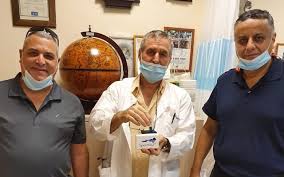In trial, Israeli gargle test gives COVID results in 1 second, at 95% accuracy
The Times of Israel Championing it as instant, cheap and reliable, innovators at Israel’s largest hospital say their invention could become the world’s standard COVID screening method Israeli scientists are testing a new ultra-fast gargle-and-spit test for coronavirus on hundreds of patients, and report that so far it is proving 95-percent accurate. The developers have built a USB-powered machine the size of an ashtray, which takes just one second to conduct light analysis of mouthwash that a patient has gargled. Israeli scientists are testing a new ultra-fast gargle-and-spit test for coronavirus on hundreds of patients, and report that so far it is proving 95-percent accurate. The developers have built a USB-powered machine the size of an ashtray, which takes just one second to conduct light analysis of mouthwash that a patient has gargled. Israeli scientists are testing a new ultra-fast gargle-and-spit test for coronavirus on hundreds of patients, and report that so far it is proving 95-percent accurate. The developers have built a USB-powered machine the size of an ashtray, which takes just one second to conduct light analysis of mouthwash that a patient has gargled. They are about halfway through a trial of 400 people at Israel’s largest hospital, Sheba Medical Center, and say that if accuracy levels continue to impress, they expect it to become available internationally by the end of the year. The innovation team, drawn from Sheba and the New sight imaging company, says that the technology has the potential to replace PCR testing, which includes an unpleasant swabbing process and requires lengthy lab analysis, as the main screening method used worldwide. PCR tests are believed to be around 80% accurate. Accelerated PCR testing, the fastest current method, is not widely available and with a 15-minute turnaround at its best, comes at a financial cost and with a reduction in accuracy levels. “This system is very rapid, cheap, and is looking reliable,” Prof. Eli Schwartz, head of the trial and of Sheba’s Center for Geographic Medicine, told The Times of Israel. “It’s suitable for mass screening, as well as airport screening, screening at nursing homes, and even screening at home. ”He added: “The idea is to mostly replace PCR tests, especially in places where you need mass screening.” Schwartz said that the system will give highly accurate positive-negative results, and PCR testing will only be needed if results are borderline, or if medical professionals need detailed information on the viral load, which his test will not provide. Patients rinse with 10 milliliters of a special mouthwash, and then spit into a tube. The sample is placed in a machine that analyzes it, and reports whether it matches the profile of a sample infected with COVID-19.The machine, called the SpectraLIT, does not require any chemicals, and no medical skills are required to operate it.Eli Assoolin, CEO of New sight, told The Times of Israel that the machine shines light through the sample and onto a special chip. “A light source goes thought it, and part of the light is absorbed, and the rest is captured by the sensors,” he said. The process is known as determining the sample’s “spectral signature”: matter reflects different light signatures, depending on its composition. Artificial intelligence tools have made it possible for the developers to determine what the signature for mouthwash from a coronavirus-positive person looks like, as opposed to mouthwash from anyone else. In the weeks before the current trial, staff fed spectral signature data into the chip from numerous people whose positivity/negativity state was already known. Data gathered by the sensors for each person’s spectral signature was entered into an algorithm, which used it to build a profile of infected and non-infected people. If the new screening method becomes widespread and makes testing more accessible, as he hopes, Schwartz said it will prove “lifesaving” by alerting people to self-isolate before they would otherwise know. Assoolin said it will also solve a major problem of PCR supply shortage. “There’s a big shortage of PCR test kits, and we’re getting rid of the need for these costly kits and chemicals needed for processing,” he commented. Assoolin said that patents have been filed for the technology, internationally. Virusight Diagnostics, a company jointly established by Sheba and Newsight, can quickly start mass production of the machines and materials for tests, he stated. He added: “We hope that by the end of this year the system will be commercially available to everyone, and before then we hope it will be used in large pilots, including in airports. ”The tube and specially-formulated mouthwash that are given to patients will cost 25 cents, a little less than a shekel. Developers say they are hoping that once the machines are in mass production, they will be available from $200, around NIS 700.












